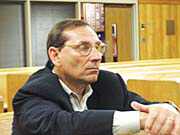After waiting for more than a dozen years to be able to tax hotel rooms, the Secaucus Town Council wasted no time last week in introducing an ordinance that will eventually generate millions in additional yearly revenues.
The Town Council held a special meeting on July 6, the first business day after Gov. Jim McGreevey signed the measure into law on July 1.
“This measure is long overdue,” said Mayor Dennis Elwell. “And [it] enables us to recoup the hundreds of thousands of dollars Secaucus residents pay for out-of-town guests who use our services.”
This came as part of the state’s effort to balance its budget and was approved during a marathon legislative session that started at 9 a.m. on June 30 and went until the afternoon of July 1.
The measure allows most municipalities throughout the state to tax hotel and motel rooms, provided the town has an ordinance in place, and that it does not already fall under the older hotel tax formula. Under this new law, Newark and Atlantic City, which have existing hotel taxes, are excluded.
Although drastically changed since its first being proposed, the tax legislation had its origin in Secaucus Town Hall in 1990, when then Town Administrator Phil Kiefer suggested it would be a great revenue source.
“We were in the conference room,” said Assemblyman Anthony Impreveduto (D-32nd Dist.), author of the legislation. “I proposed it. But the timing was poor.”
Impreveduto said voters were protesting tax increases at the time that eventually led to an anti-tax Republican administration that bottled up the legislation for more than a decade.
Secaucus has nearly 2,500 hotel rooms, each of which will generate funds for each night they are occupied. “We are a town that receives very, very little state aid,” Elwell said. “And those 2,000 rooms do require a lot of police, fire, and emergency services.”
Variations of the proposed law were bandied about right up until near the end, with 6 percent proposed up until very late in the process.
Until late in the negotiating sessions on June 30, the legislation would not have given Secaucus any money this year, with all of the cash going to the state to balance its budget. Secaucus would begin receiving a percentage on July 1, 2004.
A last-minute compromise boosted the tax to 7 percent this year, with one percent going to the town the moment it has an ordinance in place. On July 1, 2004, the per-room tax will increase to 8 percent, with 3 percent coming into the town’s general revenues.
Projections say that if the 1 percent tax is charged for a year, with only 70 percent of the rooms rented, this could generate as much as $988,661. This could be $2.8 million a year after the 3 percent rate comes into play.
Last year, Secaucus hired a lobbyist to promote the bill in order to recoup many of the funds that town expended on emergency services, such as fire, ambulance and police.
Elwell argued that Secaucus should be allowed to pass on some of the cost for these services to the out-of-town guests who require them during their stay. These services are often the highest cost in the municipal budget.
Police services yearly run more than $3.5 million, and the cost to staff an ambulance is more than $160,000. Under state law, municipalities must provide police, fire and other services to hotel guests.
Elwell praised the efforts of Impreveduto, who has pressed for the tax as fair treatment to municipalities providing such services.
“Assemblyman Impreveduto really looked out for Secaucus’ interests through this whole process in Trenton,” he said.
Boom in business
Because of its proximity to Manhattan, and because of daily room rates at roughly half of the $200 to $400 charged in New York, Secaucus has seen a boom in the hotel business in the past decade.
“Fiscally it’s extremely important to the town,” said Impreveduto. “It will be a substantial amount of money that I’m sure will go to property tax relief.”
Governor McGreevey signed the legislation Tuesday along with a package of companion tax bills and the state budget. The tax is expected to generate $119 million for the state in the first year.
Next year, the municipal share will increase to 3 percent, and the state’s portion will drop to 5 percent.
Tourism industry concerned about effect
In general, New Jersey tourism people believe the new tax will have a negative impact on tourism throughout the state – which has already declined since Sept. 11, 2001
“Many visitors to the New York area stay in New Jersey because it’s cheaper than New York City. New York has a room tax of 13.5 percent plus $2 per hotel room,” said Deborah Ryan-Pelletier, president of the Gateway Tourism Council and a marketing executive at the Crowne Plaza Meadowlands Hotel in Secaucus.
But between New Jersey’s 6 percent sales tax on products and the new 7 percent hotel tax, the Garden State will now offer less of a competitive edge on price, she said.
“While we will still have lower price than Manhattan, many tourists may not see much of a difference and stay away from our area,” Ryan-Pelletier said.
The Gateway Region is one of six regions in the state. It incorporates Bergen, Hudson, Essex, Middlesex and Passaic counties, the nearest counties to New York City and the most vulnerable to competition with New York City’s hotels.
Although the state will use some of the hotel tax revenues to promote tourism, Ryan-Pelletier said the negative perception of the tax may lower tourism anyway.
“We were never in favor of the tax, but we knew that some point it would be inevitable,” she said. “So rather than lose the whole battle, we fought hard to get something out of it.”
